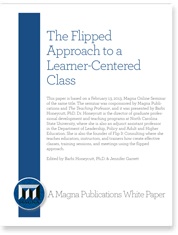The New Media Consortium (NMC) and the EDUCAUSE Learning Initiative (ELI) have released the 2014 Horizon Report. This year’s NMC Horizon Report identifies the “Integration of Online, Hybrid, and Collaborative Learning” and “The Growing Ubiquity of Social Media” as fast moving trends likely to drive substantive changes in higher education over the next one to two years.
Read more ›CURRENT ARTICLE • February 03
OTHER RECENT ARTICLES
10 Assessment Design Tips for Increasing Online Student Retention, Satisfaction and Learning
How much time do we put into the design of the assessment plans in our online courses? Is most of that time focused upon summative graded assignments that factor into the course grade? Or, do they also include opportunity for practice and informal feedback?
Read More › The following is an excerpt from the whitepaper “The Flipped Approach to a Learner-Centered Class.”
The following is an excerpt from the whitepaper “The Flipped Approach to a Learner-Centered Class.”
I was recently asked by a friend and colleague to review her syllabus. She wanted to make sure she had enough policies to address all the classroom issues that now emerge. Policies regarding plagiarism, class cancellation procedures, references to various official university handbook codes, and even mandated contingencies for an H1N1 virus outbreak were dutifully laid out. Indeed, the syllabus, despite some mention of the course itself, read far more like a legal document than an introduction and a guide to a classroom experience.
Read More ›Lumen Learning, OpenStax College aim to expand reach of free, high-quality textbooks
Taking aim at the high cost of commercial textbooks, Rice University-based publisher OpenStax College today announced a partnership with open-education pioneer Lumen Learning that is projected to save students $10 million over the next two years by facilitating the adoption of free, online textbooks by colleges and universities.
Read More › “Efficient and effective learning starts with a proper mindset,” Stephen Chew writes in his short, readable, and very useful chapter, “Helping Students to Get the Most Out of Studying.” Chew continues, pointing out what most of us know firsthand, students harbor some fairly serious misconceptions that undermine their efforts to learn. He identifies four of them.
“Efficient and effective learning starts with a proper mindset,” Stephen Chew writes in his short, readable, and very useful chapter, “Helping Students to Get the Most Out of Studying.” Chew continues, pointing out what most of us know firsthand, students harbor some fairly serious misconceptions that undermine their efforts to learn. He identifies four of them.
Cynthia Schmitt, senior director of continuing education at Florida Institute of Technology, tries to make the online learning experience comfortable and efficient for students. Students want their courses to be convenient, easy to use, responsive, and accessible so that the technology does not get in the way of learning. Here are some ways Schmitt recommends achieving these goals:
Read More ›We all understand that writing is important and our students should do it well. Even so, many professors feel uncertain when teaching it, especially when their subject area is something far removed from “Composition 101.” Even instructors who work on writing skills find it challenging to maintain momentum when their own academic content inevitably requires attention. Moreover, students, many of whom are easily stressed, worry that their grades will suffer when an “outsider” teaches writing. Some colleges have found it hard to sustain Writing Across the Curriculum (WAC) programs just because of this. But it isn’t a lost cause. Writing need not be so frightening and teaching it can be fun…for both students and instructors. And the writing lessons themselves don’t have to detract from any other academic content. Really!
Read More ›In my early years as a college professor, I dutifully focused on learning student names as a way of building relationships. Students also got exposed to the names of other students in the class, but beyond introductions on the first night, it wasn’t the primary goal of my naming activities.
Read More ›Most teachers daily confront the reality that student attention wanders in class. They can be seen nodding off, sleeping, gazing distractedly at some point other than the front of the room, texting, or working on something for another class. It’s a problem, and one that teachers often find hard not to take personally. Dealing with the emotional reaction engendered by inattention is easier when it’s more fully understood, and here’s an example that illustrates why.
Read More ›




